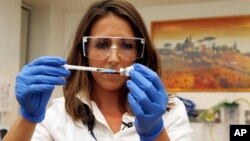A clinical trial of a promising Ebola vaccine has gotten underway in the west African country of Mali, which borders Guinea, the epicenter of the deadly viral epidemic that now has killed 4,000 people.
This phase of testing of the experimental vaccine against Ebola began this week in Mali when it was given to three health workers who volunteered. The health workers would be the first to fight the disease if it broke out in Bamako.
Health workers are on the frontline and run the highest risk of being infected, says the director of the Mali center for vaccine development, Dr. Samba Sow.
The trials are taking place to determine if the potential vaccine is safe and effective, explained Sow.
Mali has no Ebola cases but it borders Guinea, where the outbreak began.
So far the researchers haven’t seen any significant ill effects from the vaccine, including Sow, who was the first to be injected.
"Since I’m the one responsible for the study, it makes sense I’m the first one to volunteer," said Sow.
Health workers
The researchers will test blood samples of the volunteers to make sure there is an antibody response, the signal that the vaccine may teach the immune system to recognize the virus and fight it off. Until it is used in health workers actually treating people with Ebola, however, there will be no real proof that it works.
The trials are proceeding with unprecedented speed and the co-operation of a large number of international organizations and governments, in the hope of having something available that is at least partially protective before the end of the year.
"I have never seen such a rapid response in developing a vaccine against any disease before," said Sow.
Trials began in the U.S. and at Oxford University a couple of weeks ago. In Mali, four health workers have been vaccinated so far and an additional 37 will receive the vaccine in the coming weeks.
The researchers are in the process of “fast tracking” the vaccine to protect health workers, the group that have been hit the hardest since the Ebola outbreak started in late March this year.
Mali is the first country in Africa where the vaccine is being tested. In a couple weeks the vaccine will also be given to health workers in Ghana.
Vaccine development
The vaccine, developed by researchers at the U.S. National Institutes of Health and British drug manufacturer GlaxoSmithKline, was 100 percent effective in protecting monkeys against lethal exposure to Ebola in pre-clinical trials.
The vaccine stimulates the immune system using a non-infectious Ebola protein carried by a harmless cold virus, according to vaccine researcher Myron Levine, director of the Center for Vaccine Development at the University of Maryland. He is helping conduct the clinical trials in Mali.
“I’ve been doing vaccine development for 44 years. Hands on, I have never seen anything move so quickly,” said Levine.
Levine said Mali has good border security, but Ebola is continuing to spread unchecked in Guinea, Liberia and Sierra Leone.
Like the smallpox vaccine, the one against Ebola could potentially prevent full-blown disease in those exposed to the deadly virus, including health care workers.
Levine said regulatory approval could quickly follow successful clinical trials.
“Everybody wants to see the licensure of Ebola vaccine -- trying to get license as quickly as possible as long as the data are there to know that it’s safe, immunogenic and protective,” he said.
Rapid response
GlaxoSmithKline is manufacturing 10,000 doses of the vaccine, which Levine said could be administered as soon as the drug gets the nod from regulators in the United States and Europe. He said because of the limited supply, distribution of the vaccine will be targeted initially.
“When it’s recognized [all the data are in] at least, we can could come in and try to vaccinate family contacts and vaccinate the population around where cases are occurring,” said Levine.
In addition to Mali, trials of the experimental vaccine have also been carried out in Britain.
Levine says two more people in Mali received the vaccine Friday. Another 15 will be vaccinated after that, if all goes as planned.














